Comparative Analysis: UK & Germany Social Care Policy Report
VerifiedAdded on 2023/04/03
|9
|1377
|151
Report
AI Summary
This report offers a comparative analysis of social care policies in the UK and Germany, focusing on their historical development, key concepts, and policy implementations. The introduction defines social care policy and sets the stage for a comparison of the UK and Germany. The report details the historical evolution of social care in the UK, including pre-1939 statutory services, the move towards community care in the 1950s and 1960s, and related challenges. It contrasts this with Germany's social welfare system, highlighting its bottom-up approach and the role of LTCI (Long-Term Care Insurance). The report then critically appraises key concepts, such as funding and collaboration, and concludes by emphasizing the need for the UK to learn from Germany's approach to ensure proper funding and an even distribution of facilities. The report also includes visual aids comparing the spending on social care policies between the UK and Germany. References are provided to support the arguments and findings presented in the report.

Running head: CONTEMPORARY WELFARE
Contemporary welfare and social policy
Name of the Student:
Name of the University:
Author’s Note:
Contemporary welfare and social policy
Name of the Student:
Name of the University:
Author’s Note:
Paraphrase This Document
Need a fresh take? Get an instant paraphrase of this document with our AI Paraphraser
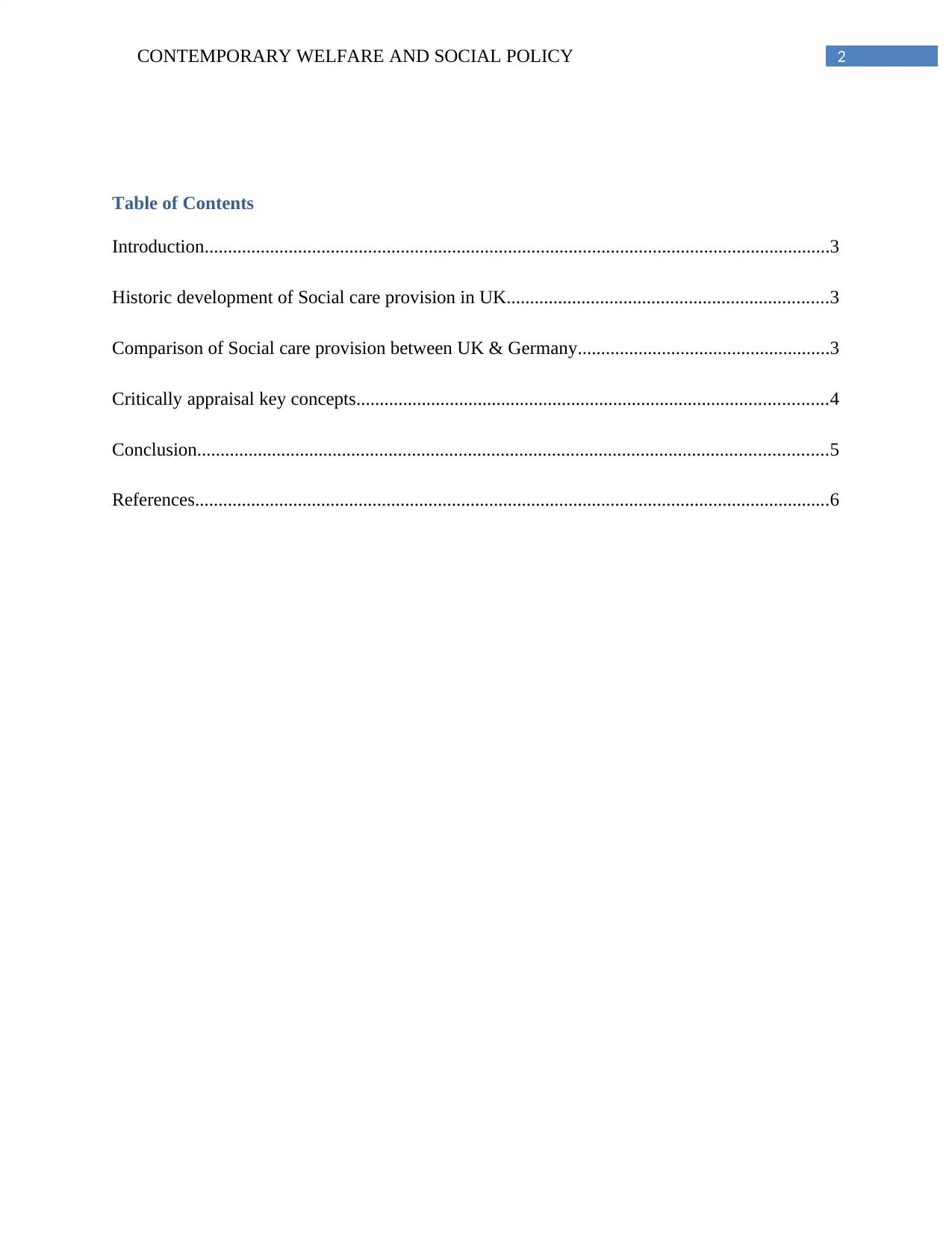
2CONTEMPORARY WELFARE AND SOCIAL POLICY
Table of Contents
Introduction......................................................................................................................................3
Historic development of Social care provision in UK.....................................................................3
Comparison of Social care provision between UK & Germany......................................................3
Critically appraisal key concepts.....................................................................................................4
Conclusion.......................................................................................................................................5
References........................................................................................................................................6
Table of Contents
Introduction......................................................................................................................................3
Historic development of Social care provision in UK.....................................................................3
Comparison of Social care provision between UK & Germany......................................................3
Critically appraisal key concepts.....................................................................................................4
Conclusion.......................................................................................................................................5
References........................................................................................................................................6
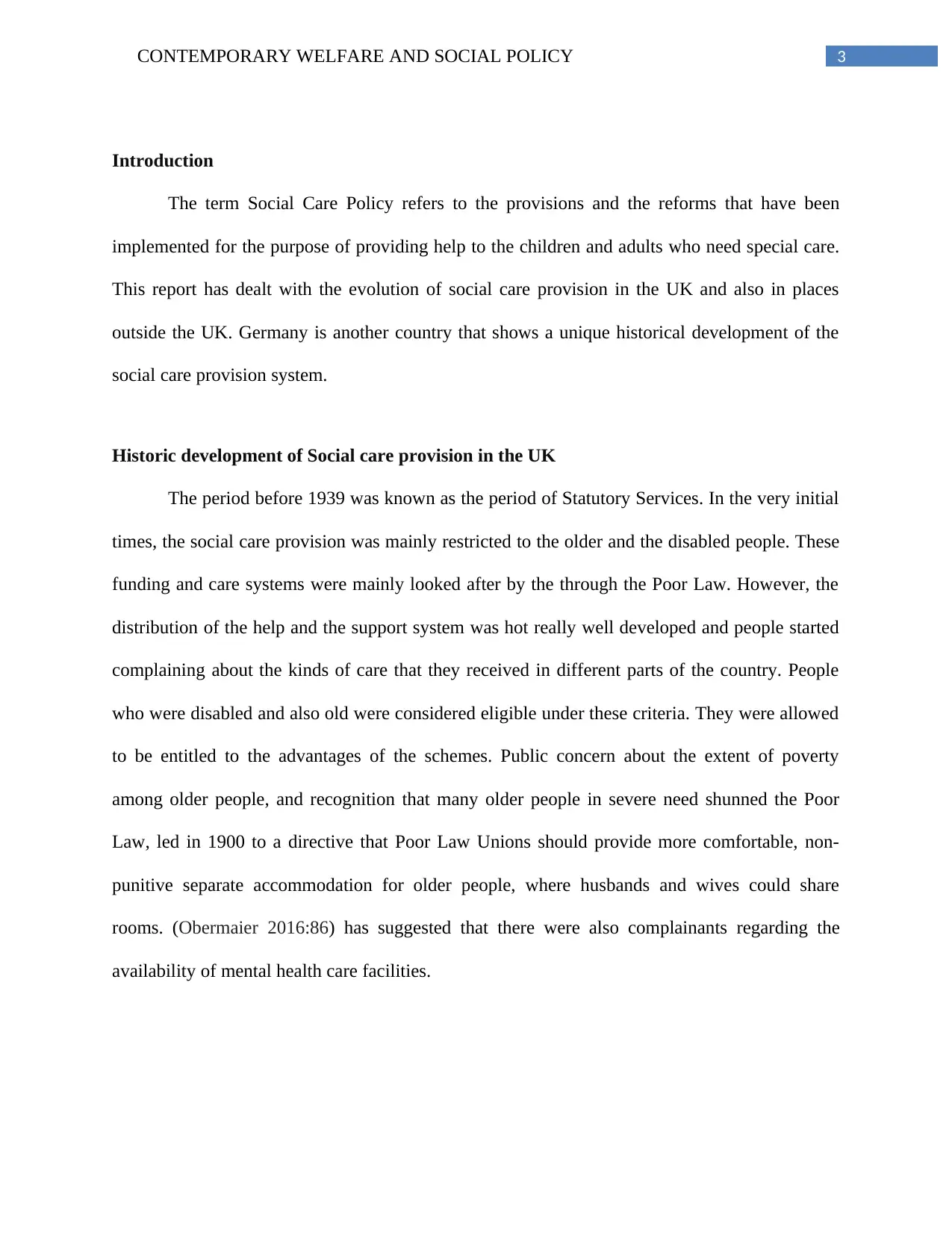
3CONTEMPORARY WELFARE AND SOCIAL POLICY
Introduction
The term Social Care Policy refers to the provisions and the reforms that have been
implemented for the purpose of providing help to the children and adults who need special care.
This report has dealt with the evolution of social care provision in the UK and also in places
outside the UK. Germany is another country that shows a unique historical development of the
social care provision system.
Historic development of Social care provision in the UK
The period before 1939 was known as the period of Statutory Services. In the very initial
times, the social care provision was mainly restricted to the older and the disabled people. These
funding and care systems were mainly looked after by the through the Poor Law. However, the
distribution of the help and the support system was hot really well developed and people started
complaining about the kinds of care that they received in different parts of the country. People
who were disabled and also old were considered eligible under these criteria. They were allowed
to be entitled to the advantages of the schemes. Public concern about the extent of poverty
among older people, and recognition that many older people in severe need shunned the Poor
Law, led in 1900 to a directive that Poor Law Unions should provide more comfortable, non-
punitive separate accommodation for older people, where husbands and wives could share
rooms. (Obermaier 2016:86) has suggested that there were also complainants regarding the
availability of mental health care facilities.
Introduction
The term Social Care Policy refers to the provisions and the reforms that have been
implemented for the purpose of providing help to the children and adults who need special care.
This report has dealt with the evolution of social care provision in the UK and also in places
outside the UK. Germany is another country that shows a unique historical development of the
social care provision system.
Historic development of Social care provision in the UK
The period before 1939 was known as the period of Statutory Services. In the very initial
times, the social care provision was mainly restricted to the older and the disabled people. These
funding and care systems were mainly looked after by the through the Poor Law. However, the
distribution of the help and the support system was hot really well developed and people started
complaining about the kinds of care that they received in different parts of the country. People
who were disabled and also old were considered eligible under these criteria. They were allowed
to be entitled to the advantages of the schemes. Public concern about the extent of poverty
among older people, and recognition that many older people in severe need shunned the Poor
Law, led in 1900 to a directive that Poor Law Unions should provide more comfortable, non-
punitive separate accommodation for older people, where husbands and wives could share
rooms. (Obermaier 2016:86) has suggested that there were also complainants regarding the
availability of mental health care facilities.
⊘ This is a preview!⊘
Do you want full access?
Subscribe today to unlock all pages.

Trusted by 1+ million students worldwide
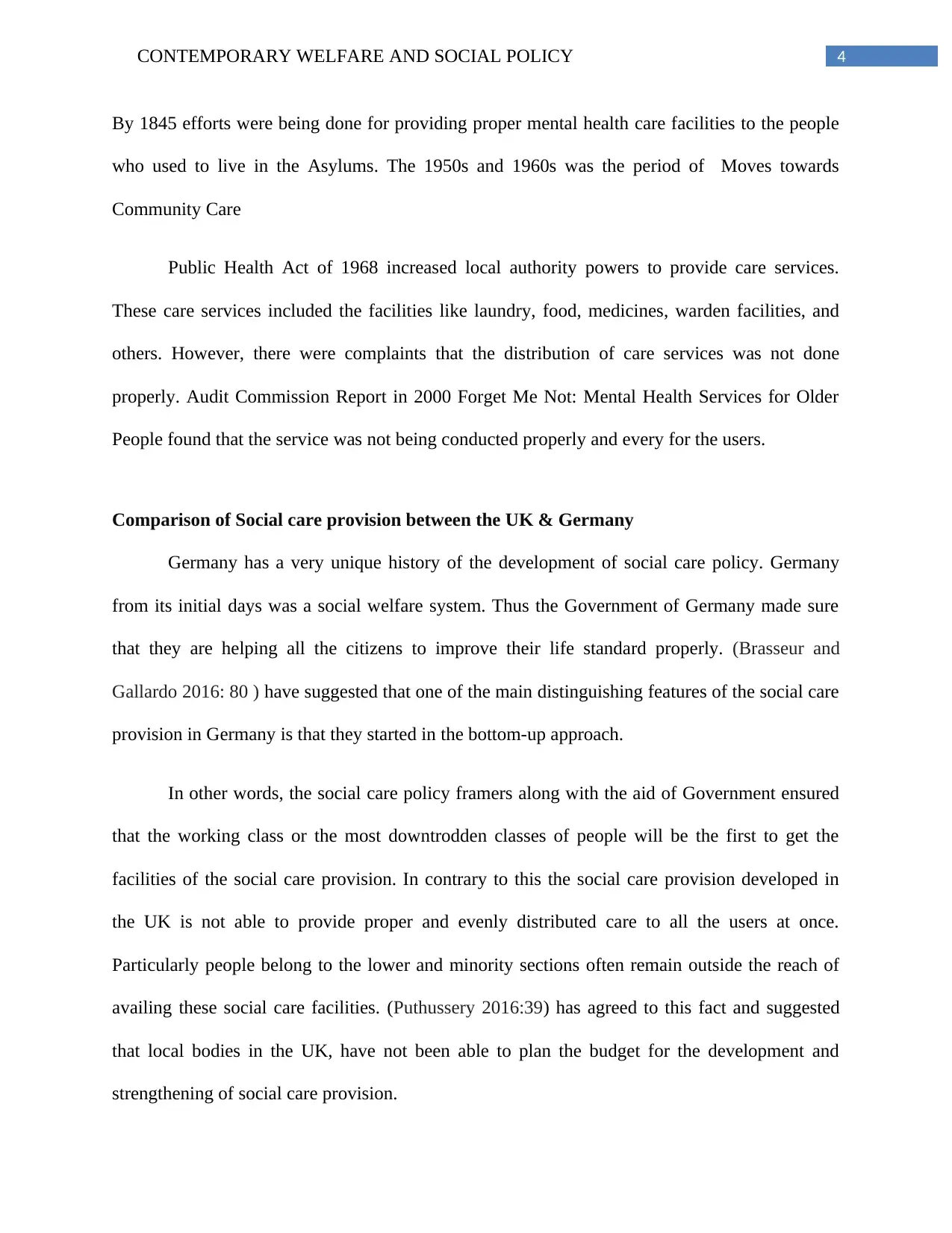
4CONTEMPORARY WELFARE AND SOCIAL POLICY
By 1845 efforts were being done for providing proper mental health care facilities to the people
who used to live in the Asylums. The 1950s and 1960s was the period of Moves towards
Community Care
Public Health Act of 1968 increased local authority powers to provide care services.
These care services included the facilities like laundry, food, medicines, warden facilities, and
others. However, there were complaints that the distribution of care services was not done
properly. Audit Commission Report in 2000 Forget Me Not: Mental Health Services for Older
People found that the service was not being conducted properly and every for the users.
Comparison of Social care provision between the UK & Germany
Germany has a very unique history of the development of social care policy. Germany
from its initial days was a social welfare system. Thus the Government of Germany made sure
that they are helping all the citizens to improve their life standard properly. (Brasseur and
Gallardo 2016: 80 ) have suggested that one of the main distinguishing features of the social care
provision in Germany is that they started in the bottom-up approach.
In other words, the social care policy framers along with the aid of Government ensured
that the working class or the most downtrodden classes of people will be the first to get the
facilities of the social care provision. In contrary to this the social care provision developed in
the UK is not able to provide proper and evenly distributed care to all the users at once.
Particularly people belong to the lower and minority sections often remain outside the reach of
availing these social care facilities. (Puthussery 2016:39) has agreed to this fact and suggested
that local bodies in the UK, have not been able to plan the budget for the development and
strengthening of social care provision.
By 1845 efforts were being done for providing proper mental health care facilities to the people
who used to live in the Asylums. The 1950s and 1960s was the period of Moves towards
Community Care
Public Health Act of 1968 increased local authority powers to provide care services.
These care services included the facilities like laundry, food, medicines, warden facilities, and
others. However, there were complaints that the distribution of care services was not done
properly. Audit Commission Report in 2000 Forget Me Not: Mental Health Services for Older
People found that the service was not being conducted properly and every for the users.
Comparison of Social care provision between the UK & Germany
Germany has a very unique history of the development of social care policy. Germany
from its initial days was a social welfare system. Thus the Government of Germany made sure
that they are helping all the citizens to improve their life standard properly. (Brasseur and
Gallardo 2016: 80 ) have suggested that one of the main distinguishing features of the social care
provision in Germany is that they started in the bottom-up approach.
In other words, the social care policy framers along with the aid of Government ensured
that the working class or the most downtrodden classes of people will be the first to get the
facilities of the social care provision. In contrary to this the social care provision developed in
the UK is not able to provide proper and evenly distributed care to all the users at once.
Particularly people belong to the lower and minority sections often remain outside the reach of
availing these social care facilities. (Puthussery 2016:39) has agreed to this fact and suggested
that local bodies in the UK, have not been able to plan the budget for the development and
strengthening of social care provision.
Paraphrase This Document
Need a fresh take? Get an instant paraphrase of this document with our AI Paraphraser
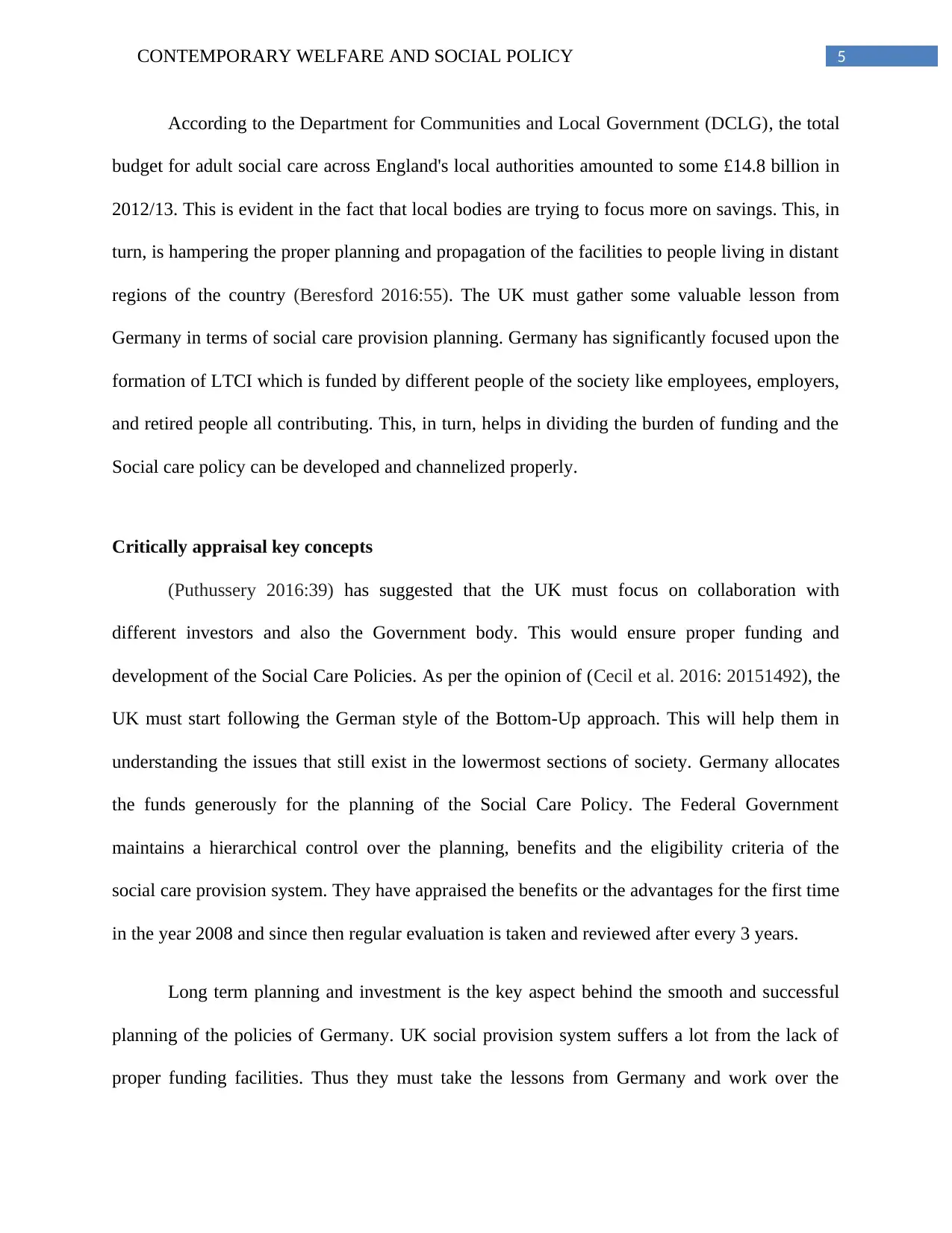
5CONTEMPORARY WELFARE AND SOCIAL POLICY
According to the Department for Communities and Local Government (DCLG), the total
budget for adult social care across England's local authorities amounted to some £14.8 billion in
2012/13. This is evident in the fact that local bodies are trying to focus more on savings. This, in
turn, is hampering the proper planning and propagation of the facilities to people living in distant
regions of the country (Beresford 2016:55). The UK must gather some valuable lesson from
Germany in terms of social care provision planning. Germany has significantly focused upon the
formation of LTCI which is funded by different people of the society like employees, employers,
and retired people all contributing. This, in turn, helps in dividing the burden of funding and the
Social care policy can be developed and channelized properly.
Critically appraisal key concepts
(Puthussery 2016:39) has suggested that the UK must focus on collaboration with
different investors and also the Government body. This would ensure proper funding and
development of the Social Care Policies. As per the opinion of (Cecil et al. 2016: 20151492), the
UK must start following the German style of the Bottom-Up approach. This will help them in
understanding the issues that still exist in the lowermost sections of society. Germany allocates
the funds generously for the planning of the Social Care Policy. The Federal Government
maintains a hierarchical control over the planning, benefits and the eligibility criteria of the
social care provision system. They have appraised the benefits or the advantages for the first time
in the year 2008 and since then regular evaluation is taken and reviewed after every 3 years.
Long term planning and investment is the key aspect behind the smooth and successful
planning of the policies of Germany. UK social provision system suffers a lot from the lack of
proper funding facilities. Thus they must take the lessons from Germany and work over the
According to the Department for Communities and Local Government (DCLG), the total
budget for adult social care across England's local authorities amounted to some £14.8 billion in
2012/13. This is evident in the fact that local bodies are trying to focus more on savings. This, in
turn, is hampering the proper planning and propagation of the facilities to people living in distant
regions of the country (Beresford 2016:55). The UK must gather some valuable lesson from
Germany in terms of social care provision planning. Germany has significantly focused upon the
formation of LTCI which is funded by different people of the society like employees, employers,
and retired people all contributing. This, in turn, helps in dividing the burden of funding and the
Social care policy can be developed and channelized properly.
Critically appraisal key concepts
(Puthussery 2016:39) has suggested that the UK must focus on collaboration with
different investors and also the Government body. This would ensure proper funding and
development of the Social Care Policies. As per the opinion of (Cecil et al. 2016: 20151492), the
UK must start following the German style of the Bottom-Up approach. This will help them in
understanding the issues that still exist in the lowermost sections of society. Germany allocates
the funds generously for the planning of the Social Care Policy. The Federal Government
maintains a hierarchical control over the planning, benefits and the eligibility criteria of the
social care provision system. They have appraised the benefits or the advantages for the first time
in the year 2008 and since then regular evaluation is taken and reviewed after every 3 years.
Long term planning and investment is the key aspect behind the smooth and successful
planning of the policies of Germany. UK social provision system suffers a lot from the lack of
proper funding facilities. Thus they must take the lessons from Germany and work over the
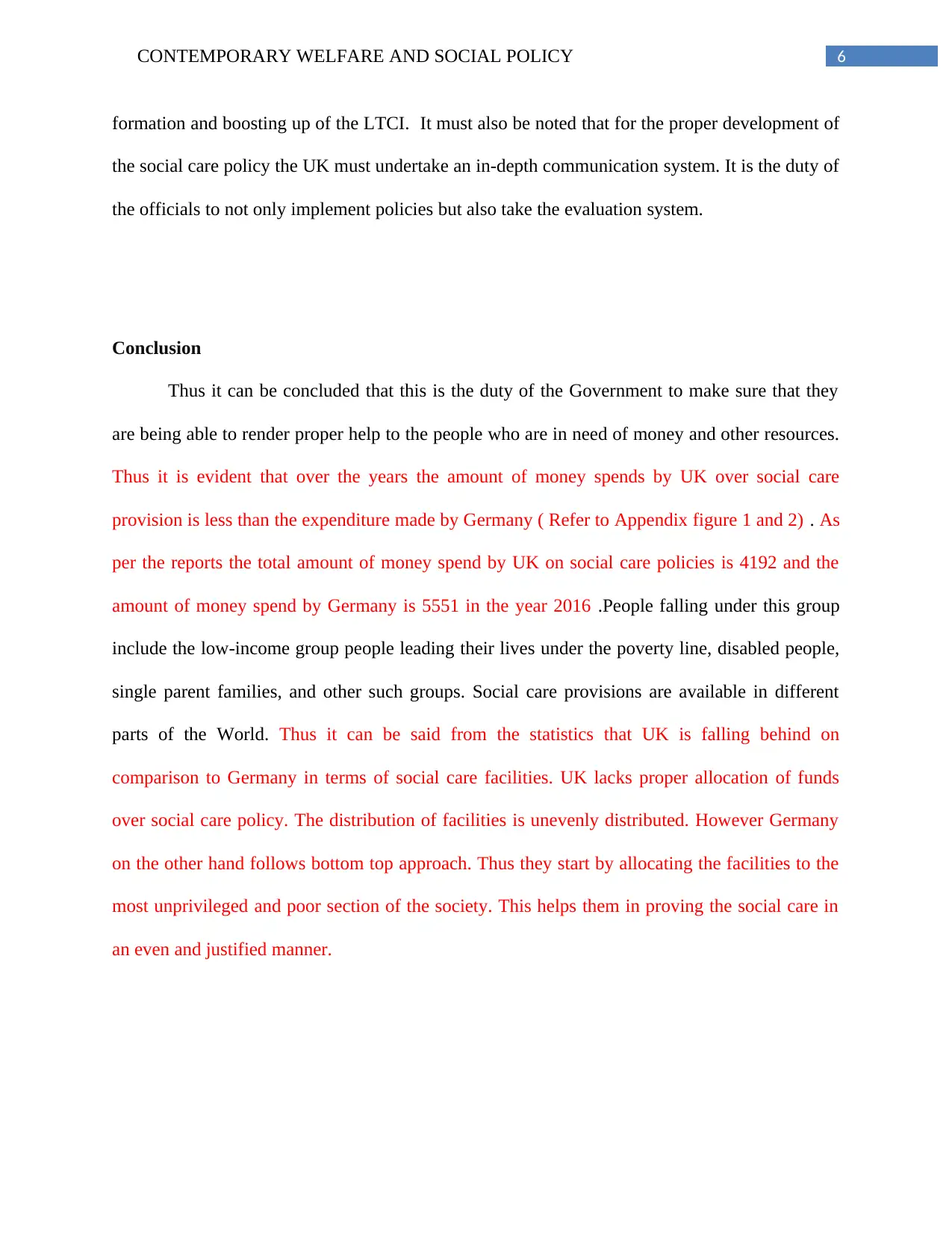
6CONTEMPORARY WELFARE AND SOCIAL POLICY
formation and boosting up of the LTCI. It must also be noted that for the proper development of
the social care policy the UK must undertake an in-depth communication system. It is the duty of
the officials to not only implement policies but also take the evaluation system.
Conclusion
Thus it can be concluded that this is the duty of the Government to make sure that they
are being able to render proper help to the people who are in need of money and other resources.
Thus it is evident that over the years the amount of money spends by UK over social care
provision is less than the expenditure made by Germany ( Refer to Appendix figure 1 and 2) . As
per the reports the total amount of money spend by UK on social care policies is 4192 and the
amount of money spend by Germany is 5551 in the year 2016 .People falling under this group
include the low-income group people leading their lives under the poverty line, disabled people,
single parent families, and other such groups. Social care provisions are available in different
parts of the World. Thus it can be said from the statistics that UK is falling behind on
comparison to Germany in terms of social care facilities. UK lacks proper allocation of funds
over social care policy. The distribution of facilities is unevenly distributed. However Germany
on the other hand follows bottom top approach. Thus they start by allocating the facilities to the
most unprivileged and poor section of the society. This helps them in proving the social care in
an even and justified manner.
formation and boosting up of the LTCI. It must also be noted that for the proper development of
the social care policy the UK must undertake an in-depth communication system. It is the duty of
the officials to not only implement policies but also take the evaluation system.
Conclusion
Thus it can be concluded that this is the duty of the Government to make sure that they
are being able to render proper help to the people who are in need of money and other resources.
Thus it is evident that over the years the amount of money spends by UK over social care
provision is less than the expenditure made by Germany ( Refer to Appendix figure 1 and 2) . As
per the reports the total amount of money spend by UK on social care policies is 4192 and the
amount of money spend by Germany is 5551 in the year 2016 .People falling under this group
include the low-income group people leading their lives under the poverty line, disabled people,
single parent families, and other such groups. Social care provisions are available in different
parts of the World. Thus it can be said from the statistics that UK is falling behind on
comparison to Germany in terms of social care facilities. UK lacks proper allocation of funds
over social care policy. The distribution of facilities is unevenly distributed. However Germany
on the other hand follows bottom top approach. Thus they start by allocating the facilities to the
most unprivileged and poor section of the society. This helps them in proving the social care in
an even and justified manner.
⊘ This is a preview!⊘
Do you want full access?
Subscribe today to unlock all pages.

Trusted by 1+ million students worldwide
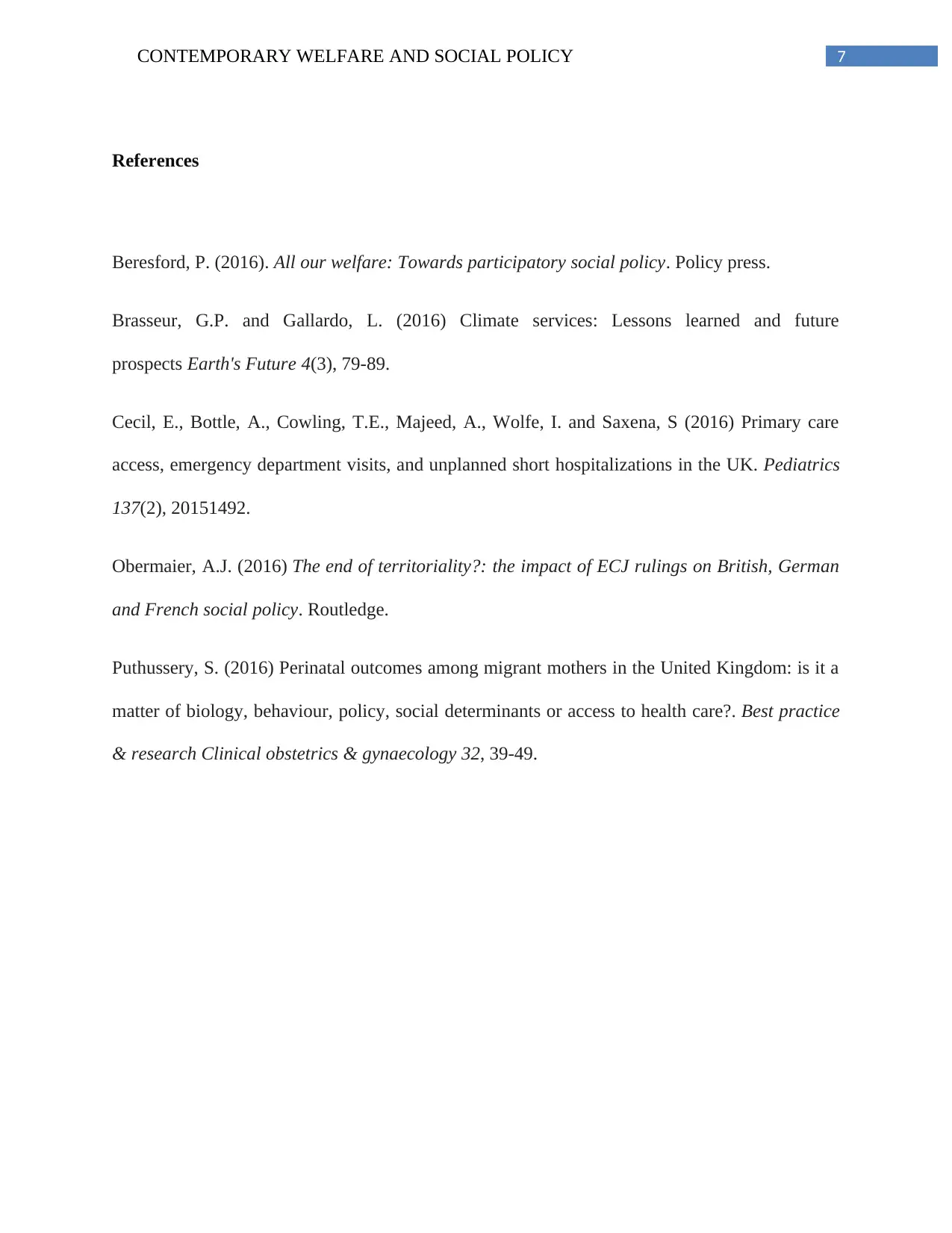
7CONTEMPORARY WELFARE AND SOCIAL POLICY
References
Beresford, P. (2016). All our welfare: Towards participatory social policy. Policy press.
Brasseur, G.P. and Gallardo, L. (2016) Climate services: Lessons learned and future
prospects Earth's Future 4(3), 79-89.
Cecil, E., Bottle, A., Cowling, T.E., Majeed, A., Wolfe, I. and Saxena, S (2016) Primary care
access, emergency department visits, and unplanned short hospitalizations in the UK. Pediatrics
137(2), 20151492.
Obermaier, A.J. (2016) The end of territoriality?: the impact of ECJ rulings on British, German
and French social policy. Routledge.
Puthussery, S. (2016) Perinatal outcomes among migrant mothers in the United Kingdom: is it a
matter of biology, behaviour, policy, social determinants or access to health care?. Best practice
& research Clinical obstetrics & gynaecology 32, 39-49.
References
Beresford, P. (2016). All our welfare: Towards participatory social policy. Policy press.
Brasseur, G.P. and Gallardo, L. (2016) Climate services: Lessons learned and future
prospects Earth's Future 4(3), 79-89.
Cecil, E., Bottle, A., Cowling, T.E., Majeed, A., Wolfe, I. and Saxena, S (2016) Primary care
access, emergency department visits, and unplanned short hospitalizations in the UK. Pediatrics
137(2), 20151492.
Obermaier, A.J. (2016) The end of territoriality?: the impact of ECJ rulings on British, German
and French social policy. Routledge.
Puthussery, S. (2016) Perinatal outcomes among migrant mothers in the United Kingdom: is it a
matter of biology, behaviour, policy, social determinants or access to health care?. Best practice
& research Clinical obstetrics & gynaecology 32, 39-49.
Paraphrase This Document
Need a fresh take? Get an instant paraphrase of this document with our AI Paraphraser
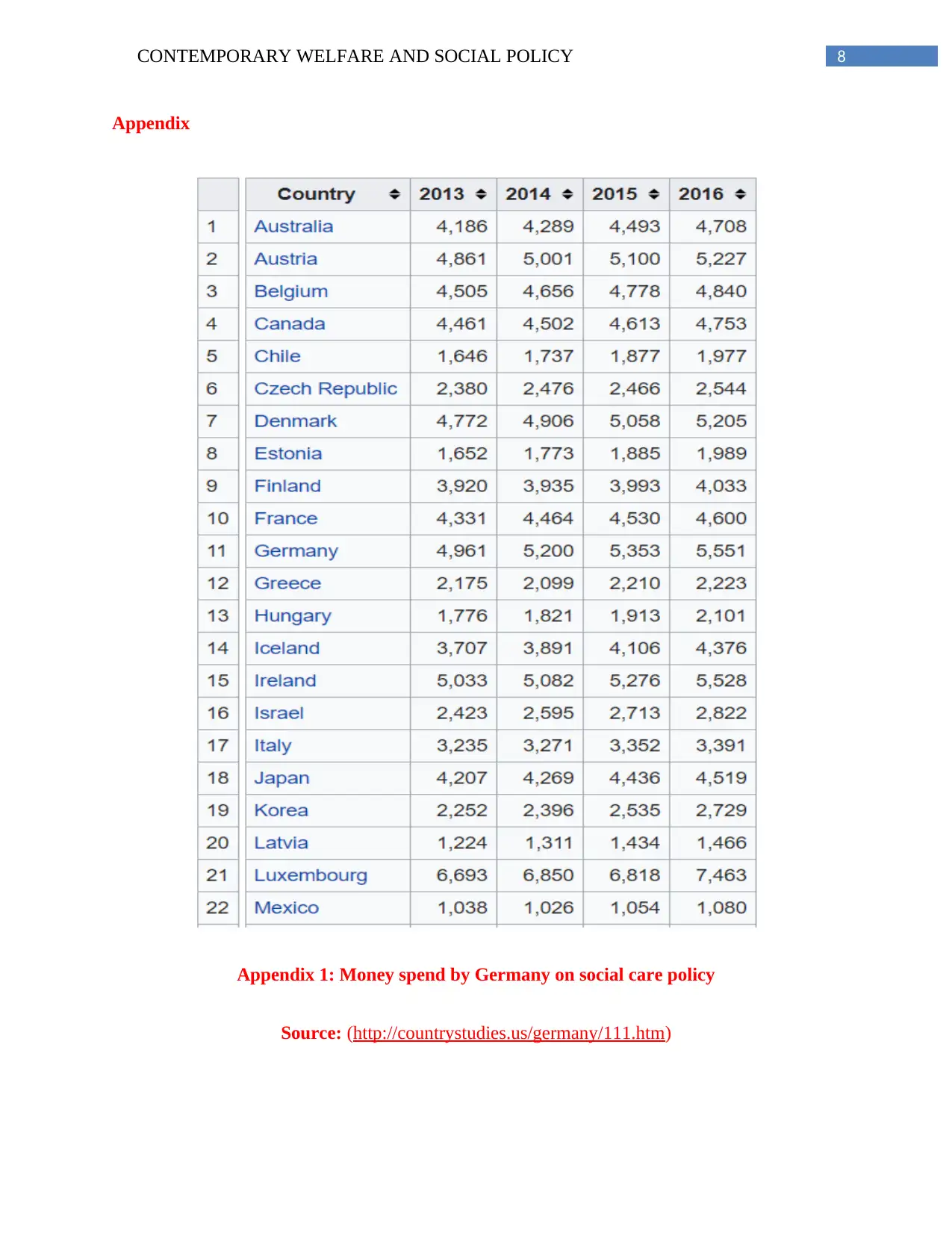
8CONTEMPORARY WELFARE AND SOCIAL POLICY
Appendix
Appendix 1: Money spend by Germany on social care policy
Source: (http://countrystudies.us/germany/111.htm)
Appendix
Appendix 1: Money spend by Germany on social care policy
Source: (http://countrystudies.us/germany/111.htm)
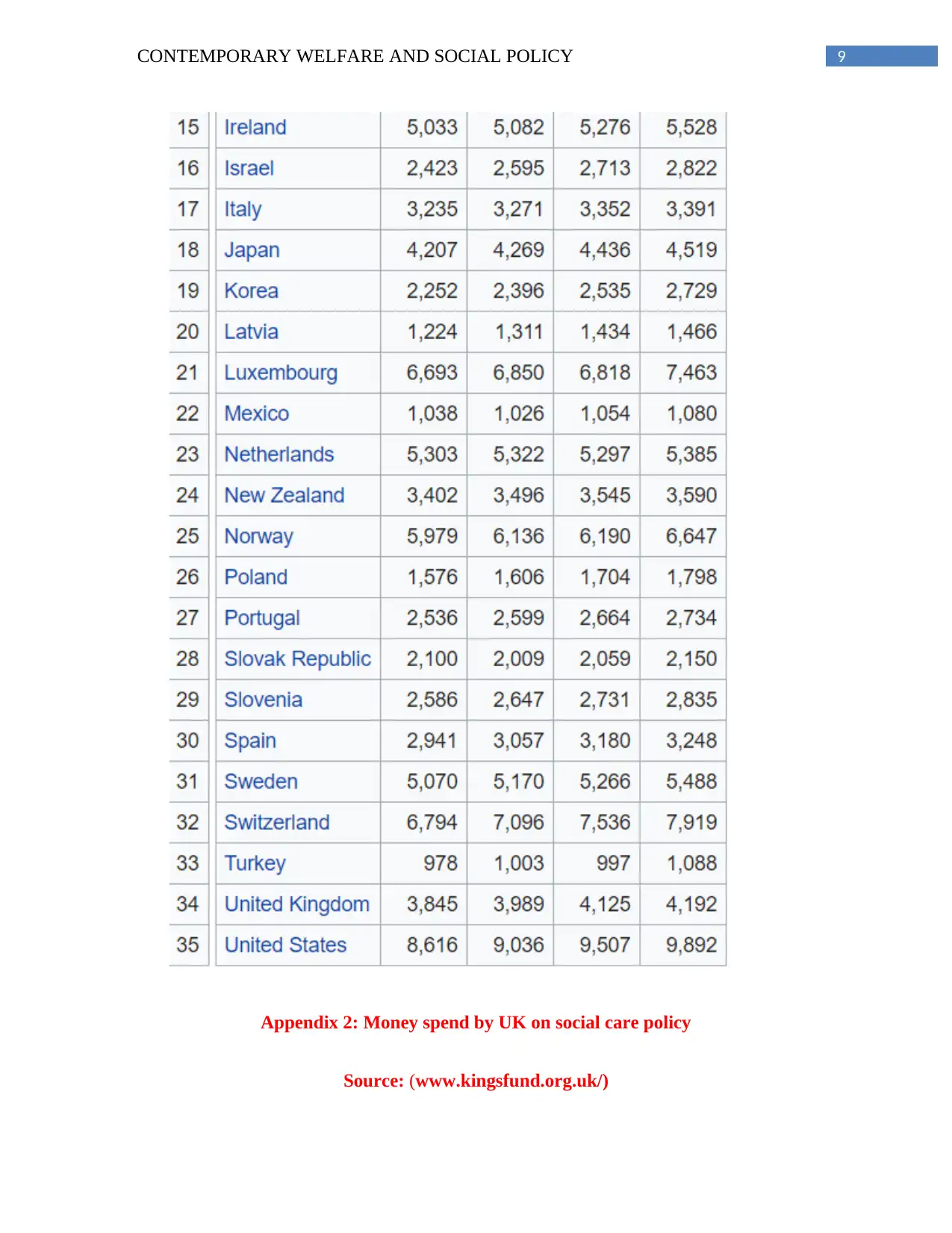
9CONTEMPORARY WELFARE AND SOCIAL POLICY
Appendix 2: Money spend by UK on social care policy
Source: (www.kingsfund.org.uk/)
Appendix 2: Money spend by UK on social care policy
Source: (www.kingsfund.org.uk/)
⊘ This is a preview!⊘
Do you want full access?
Subscribe today to unlock all pages.

Trusted by 1+ million students worldwide
1 out of 9
Related Documents
Your All-in-One AI-Powered Toolkit for Academic Success.
+13062052269
info@desklib.com
Available 24*7 on WhatsApp / Email
![[object Object]](/_next/static/media/star-bottom.7253800d.svg)
Unlock your academic potential
Copyright © 2020–2026 A2Z Services. All Rights Reserved. Developed and managed by ZUCOL.





